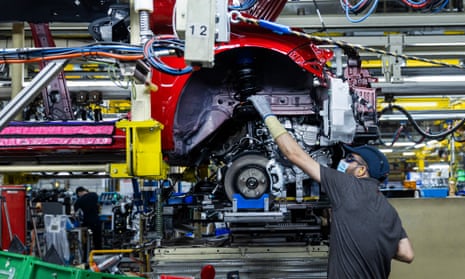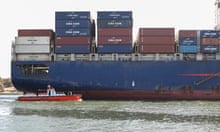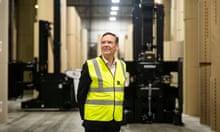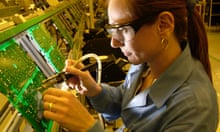Interest rate increases expected later this year will weaken a UK economy that is already expanding at its slowest pace since it began emerging from the 2021 lockdown, the latest private sector activity snapshot suggests.
Although performing slightly stronger than the eurozone or the US, the latest monthly survey from the S&P Global/Chartered Institute of Procurement and Supply (Cips) showed both the UK services and manufacturing sectors struggled to cope with rising cost of living pressures.
The squeeze on industry from dearer commodity prices resulted in the first contraction of manufacturing output since the early stages of the pandemic in May 2020.
There were, however, signs from the survey of an ebbing of the global price pressures that have contributed to the UK’s 9.4% inflation rate, the highest in 40 years. Input cost prices eased for a second month and were at their lowest since September 2021.
Firms responding to the survey reported lower commodity prices, especially metals, had started to have an impact, but service sector companies mostly said intense wage pressures due to shortages of staff and rising consumer price inflation had continued to push up their costs.
Even so, analysts said there was evidence of a turning point being reached. Samuel Tombs, the UK economist at the consultancy Pantheon Macro, said the Bank of England would be cheered by the news of abating cost pressures and firms moderating the pace of price rises due to weak demand.
The Bank’s governor, Andrew Bailey, has said a half-point increase in borrowing costs is a possibility next month, but the S&P/Cips purchasing managers’ index suggests Threadneedle Street would be tightening policy at a time when the economy is at its most vulnerable in 17 months.
The survey showed service sector activity fell from 54.3 to 53.3 in June, while manufacturing dropped from 50.3 to 49.7, while the composite output index fell from 53.7 in June to 52.8 in July. A reading below 50 suggests contraction rather than expansion.
Attempts to clear backlogs of orders meant employment continued to grow but the survey showed the pace of new job creation slowing.
Chris Williamson, the chief business economist at S&P Global Market Intelligence, said: “UK economic growth slowed to a crawl in July, registering the slowest expansion since the lockdowns of early 2021.
“Although not yet in decline, with pent-up demand for vehicles and consumer-oriented services such as travel and tourism helping to sustain growth in July, the PMI is now at a level consistent with just 0.2% GDP growth. Forward-looking indicators suggest worse is to come.”
Separate PMIs pointed to the US and the eurozone already being in recession. America’s composite PMI fell from 52.3 to 47.5 in July, its lowest level in 26 months. The rate of decline in manufacturing and services was the steepest since the start of the pandemic, due to falling demand.
Inflation currently stands at 9.1% in the US and its central bank – the Federal Reserve – has raised interest rates in response. Official borrowing costs increased by 0.75 percentage points last month and a similar-sized jump is expected on Wednesday.
Meanwhile, the eurozone’s composite index fell from 52.0 in June to 49.4 in July, with a softening of activity particularly evident in a drop from 51.3 to 48 in Germany, Europe’s biggest economy. France’s economy weakened but remained above the 50 recession cut-off point.
The European Central Bank raised interest rates by 0.5 percentage points on Thursday, and there is now strong speculation the Bank of England will announce a similar-sized increase on 4 August. Williamson said there were risks involved.
“The concern is that rising interest rates, as the Bank of England seeks to control inflation, will cause demand growth to weaken further in the coming months. To be hiking interest rates at a time of such weak business growth is unprecedented over the past quarter-century of survey history,” he said.









